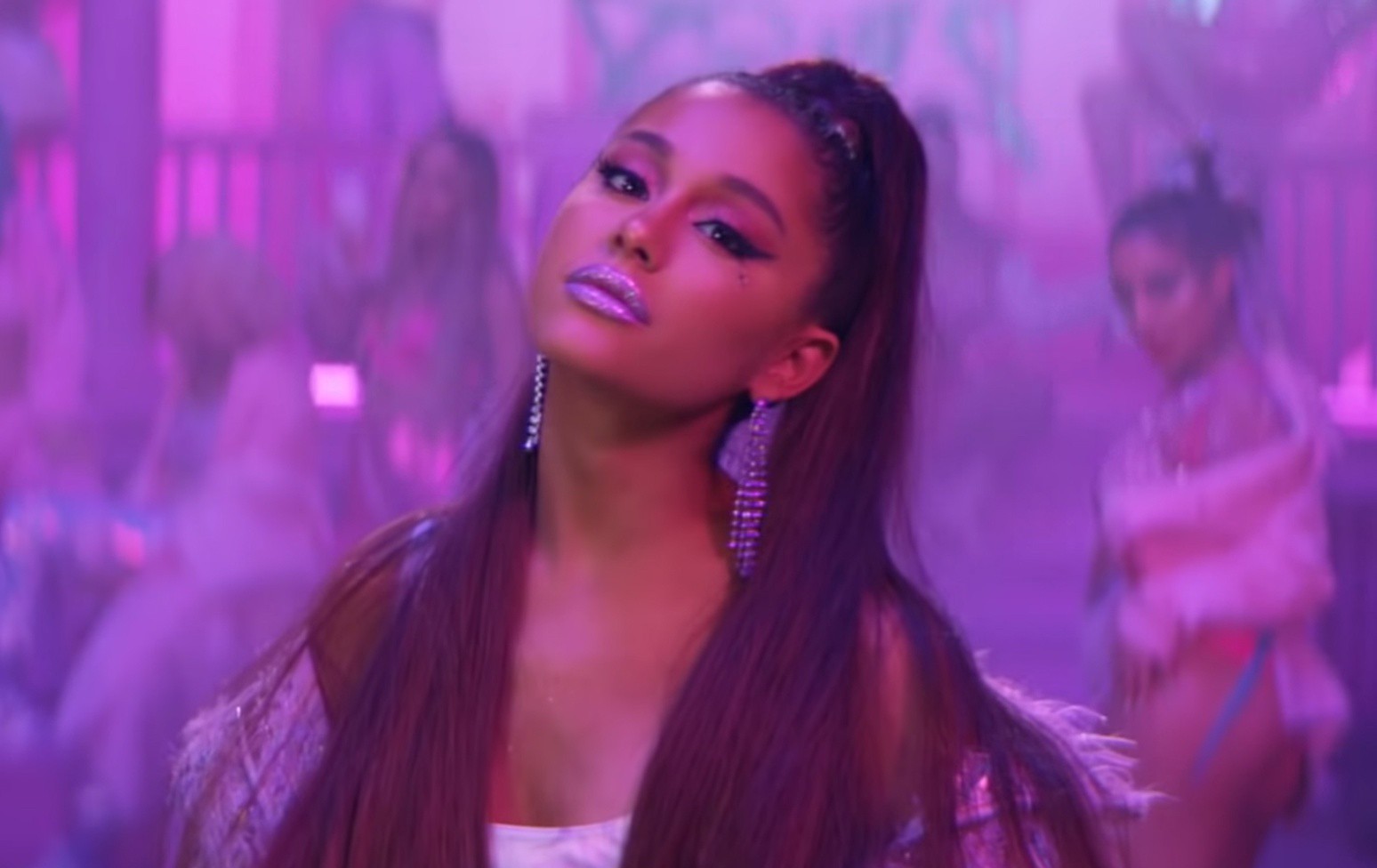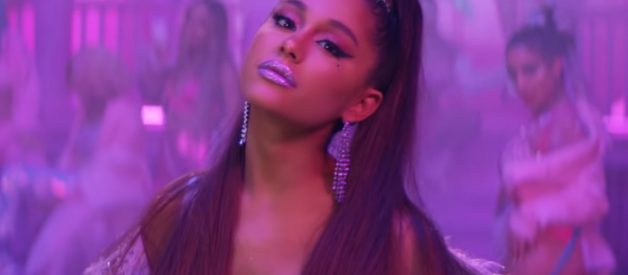Minority talent thrives in white packaging. Welcome to America.
 Ariana Grande in the ?7 Rings? video (Photo: Republic Records)
Ariana Grande in the ?7 Rings? video (Photo: Republic Records)
https://play.ht/articles/5a022e5a-e218-4269-808a-c74e4ab2fdd4
Ever since social media became the stock market of celebrity currency, trending has been the new black. Nothing screams ?You made it, girl!? like being the center of one hot topic (How you doin??) after another.
By those standards, Ariana Grande is hot stuff indeed. In recent weeks, she?s been all over the place ? even when she wasn?t anywhere in sight: She scored her first big headlines of 2019 when she boycotted the Grammys over the producers? refusal to allow her to sing a hit from Thank U, Next, her fifth studio album and fastest-seller yet.
A few weeks later, her ex-fianc Pete Davidson tossed a heckler out of his stand-up gig in New Jersey after the guy referenced Grande without naming her in a spectacularly tasteless joke. Then she got dragged on social media when Manchester Pride organizers chose her over viable LGBTQ musical acts as the headliner of its August event.
She even scored her own ?unpopular opinions? shade thread on Twitter. #BabyYou?reAStar
The loudest controversy of Grande?s new imperial age, though, is more complicated and considerably more, well, grande. Some blacks are begrudging Ariana her current success because she?s an Italian-American who finally climbed to the top of Billboard?s Hot 100 (with ?Thank U, Next? and ?7 Rings?) by hoisting herself on the back of black culture. The last black female singer to headline a number-one hit was Rihanna with ?Work? in 2016.
Grande?s fade to black musically isn?t the problem. Black audiences have embraced blue-eyed soul for years. They?re the ones who made Teena Marie an ?80s queen and Lisa Stansfield bigger than a one-hit wonder in the U.S. Aside from Marie?s 1984 number four crossover pop hit ?Lovergirl,? the late white singer-songwriter was far more popular with black audiences than she ever was with white ones.
The trouble with Grande, according to her black detractors, is less her music than her presentation: the increasingly darker skin, courtesy of self-tanner, and how she?s begun to adopt African-American Vernacular English (AAVE) in her everyday speech ? or at least in some of her interviews. Cultural appreciation via music is one thing, but what do we do about cultural appropriation to be both hotter and cooler?
Personally, I believe the crime of cultural appropriation has been greatly exaggerated. The people who are guilty of it are less culpable than the system that created an environment in which it became a serious offense punishable by possible cancellation. Where would cultural appropriation be without the racism and white privilege that are built into the American dream?
Where would cultural appropriation be without the racism and white privilege that are built into the American dream?
Racism and white privilege made cultural appropriation what it is, a regular reminder of the hypocrisy of a society that overvalues white and undervalues everything else. A member of a majority group can adopt emblems of a minority group, emblems for which members of the minority group might be ostracized, wear it proudly and cluelessly, and still be accepted ? even rewarded.
It?s a double standard that never ceases to be thoroughly infuriating, and the beneficiaries take the brunt of the backlash.
Majority rules
Consider how a group of White Anglo-Saxon Protestant ?MAGA? flag-waving Americans might react to a lone hijab-wearing Muslim woman in their midst, or a lone African woman wearing tribal garb, or a lone Native American woman dressed to honor her culture?s tradition. Most probably would stare, judge, and keep their distance.
Now consider how that same White Anglo-Saxon Protestant ?MAGA? flag-waving American crowd would react to one of their own wearing a hijab, or African tribal clothing, or a traditional Native American outfit to, say, a Halloween party.
The current climate dictates that social media?s PC contingent be outraged once the pics end up on Instagram, but in that room full of the like-minded (and colored), the white person wearing the look of a minority group would be far more acceptable to most of them. He or she might even be applauded for such an ?original? costume.
And therein lies the issue with Ariana. If she were a black female artist making the same music and using the same AAVE, would she be a multiplatinum star right now? Chances are, she?d hit the ceiling somewhere around gold and just short of platinum. She?d be a queen of R&B and merely a moderate success in the pop mainstream.
So to quote the title of an early Grande hit, a collaboration with the ultimate cultural appropriation artist Iggy Azalea, we do have a problem.
The blaccent Grande has been accused of adopting is problematic. But I?d rather a white person use it to be cool than to be funny or mocking. It?s not on par with blackface and doesn?t carry the same painful history, so I can let it slide, especially since it comes and goes with Ariana.
Speaking of blackface, Grande also has been accused of using fake tanner in order to appear more like a black woman. But do we really know for sure that this is her motive? White people have been going to the beach and using the sun (and fake tanner) to appear darker for much longer than I can remember. That doesn?t mean they want to look black.
One of the great ironies of my life is that the very features that earned me ridicule as a kid ? my dark skin, my full lips ? are the ones that some whites now want as their own. They?re now considered signs of white beauty!
One of the great ironies of my life is that the very features that earned me ridicule as a kid ? my dark skin, my full lips ? are the ones that some whites now want as their own. They?re now considered signs of white beauty!
When I was growing up in Kissimmee, Florida, during the seventies and eighties, the white people I knew weren?t clamoring for bigger lips yet, but most of them wanted a healthy tan. Sometimes the ones who drove hours to the coast to darken up were the same ones who came back to central Florida with nicely tanned skin and the N-word on their lips.
So yes, I fully understand why some blacks are calling out Grande?s darkening tactics. But when you think about it rather than just reacting to it, you realize that dark skin isn?t even a trait that?s exclusive to black people, who actually come in myriad shades of black, brown, and beige. If over-tanning is indeed appropriation, then from whom is it appropriating? When I spent five weeks in India last year, I met many locals who were as dark as I am and sometimes darker.
In defense of Ariana
Although Grande?s recent videos could use a bit more color to match her evolving sound, it?s not like she lives in a totally whitewashed world.
Her ex-boyfriend is rapper Big Sean, and she surrounds herself with black talent professionally while regularly paying homage to the black talent that inspired her. In at least one case ? Patti LaBelle?s ? the adoration is mutual. So while Grande may never qualify as even an honorary black woman, her allegiance to African-American, like her loyalty to LGBTQ, seems genuine.
Not everyone buys it, but she does have defenders. I recently watched a YouTube video in which a popular vlogger dissected cultural appropriation vs. cultural appreciation with a focus on Grande. He made some excellent points that supported both sides of the debate, as did some of the commenters. One offhand observation, in particular, stood out more than any of the others.
It was something along these lines: If people can choose their gender, they should be able to choose their color, too.
The comment stayed with me long after the video was over and made a stronger impression than the video itself. I put it on repeat in my head while I processed it and outlined my rebuttal. Here goes ?
?Choosing? gender and ?choosing? color are significantly different things. When someone who was born anatomically male but identifies as female begins to present as one (either through dress or through surgery), that person takes on the weight of the bigoted world. They have to deal with not only transphobia but sexism and misogyny, too.
Meanwhile, a white person who decides they?re actually black still benefits from white privilege, just as a black person who passes for white does. A white person who adopts the mannerisms, speech, and even the looks of a black person might do so to gain street cred, cool cred, or commercial viability. It?s often more about getting something out of being faux black than truly understanding what it?s like to be born black and gaining true empathy.
The 1986 movie Soul Man was about a white man who poses as a black student in order to qualify for a Harvard scholarship, so he was using faux blackness for his own personal gain. That?s something someone who ?chooses? their gender doesn?t do, unless it?s Albert Nobbs, the titular character of Glenn Close?s 2011 movie. But lets not forget, Nobbs didn?t survive to the end credits.
Black-ish for life ? or for a day
Even a white person who says ?I?m black? not for commercial gain but because he or she identifies as, not with, the race can wash off the black ? figuratively and/or literally ? at the end of the day. No matter how convincingly they wear it, they can never truly understand what it feels like to be black. They can talk the talk, but until they walk the walk in our proverbial shoes, ones they have to wear for life and not just for a season, they?ll never really know.
So while I have no problem with Grande?s black-ish phase, I understand why some people do. Perhaps I?m swayed by the quality of the music that?s come out of it. She?s made the best album of her career, the one that may very well go down as her crowning artistic achievement. And she couldn?t have done it without black talent, both as collaborators and as influences.
It?s just too bad that the masses don?t appreciate black talent as much as Grande does. Since the days of Elvis Presley, it?s been more palatable in a white package. Meanwhile, talented black artists who were doing what Elvis, and Ariana, were doing well before white artists became bankable doing it, spend their careers languishing in the also-ran pile.
All that said, it?s not Grande?s fault that she?s benefitting from white privilege in pop. At least she respects the community from which she borrows enough to include it in her creative process. If I blame anyone or anything, it?s the American way, a system that made her superstardom possible, one that always prefers black when it?s worn over white.


